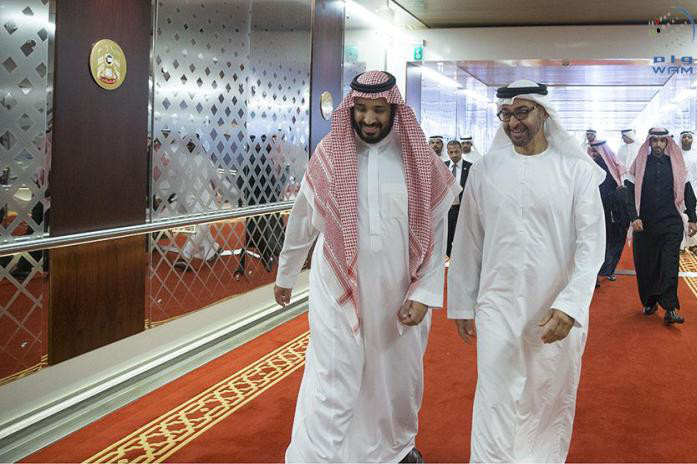by Eldar Mamedov
Recent years have seen a rise of what could be described as Arab neoconservatives: ambitious leaders such as the Crown Prince of Saudi Arabia Mohammed bin Salman and the Crown Prince of Abu Dhabi Mohammed bin Zayed. Their distinctive feature is a heavy reliance on military power to re-shape the political map of the Middle East in their favor, with the overarching aim of pushing back against Iran, a policy they share with the original, American neoconservatives.
Yet their track record is not any more successful than that of their American counterparts in places like Iraq. The war in Yemen, conceived as a week-long cakewalk by then Deputy Crown Prince Mohammad bin Salman in 2014, has turned into a bloody quagmire, with no end in sight, let alone anything that could be remotely construed as a Saudi victory. Attempts by Riyadh and Abu Dhabi to isolate Qatar have pushed the tiny emirate closer to Turkey and Iran, their regional adversaries. Heavy-handed Saudi efforts to meddle in Lebanon strengthened Hezbollah, Riyadh’s Shiite enemy, by providing it an opportunity to hone its nationalist credentials. The net result of these policies is that Iran, far from being isolated in the region, is actually becoming stronger.
As experience suggests, however, the Arab neoconservatives and their American backers are more likely to double down on their policies rather than change the approach. This is especially so since they feel emboldened by the Trump administration in Washington, which is fast becoming neoconned itself.
One of the ways they are doing so is by pressuring the European Union (EU) into joining their efforts to push back against Iran on its missile program and regional policies.
Even if the EU shares some of the American, Israeli, and Saudi concerns regarding Iran, it should strongly resist this pressure both collectively and at the level of the member states.
First of all, EU citizens did not elect their governments to please Donald Trump, Israeli Prime Minister Benjamin Netanyahu, and Mohammad bin Salman. The Global Strategy, endorsed by all 28 member states, stresses the balanced engagement with Iran and the Gulf Cooperation Council (GCC) as a cornerstone of the EU vision for the Persian Gulf region. The current Iranian government has repeatedly shown its willingness to engage in regional diplomacy based on principles that are not far apart from those embraced by the EU, namely emphasizing the legitimate interests and collective security of all regional states.
The persistence of disagreements between the EU, its member states, and Iran on some issues, like ballistic missiles, Syria, or Hezbollah, does not call necessarily for new punitive measures. The experience of the nuclear deal with Iran (the Joint Comprehensive Plan of Action or JCPOA) showed that there is space for diplomacy with Iran. With sensible trade-offs, it can also work on regional issues. The EU should leverage its ties with all the players in the region, including Iran and Saudi Arabia, to that end.
Yet this window of opportunity will not remain open forever. Iran’s political space is neither stagnant nor monolithic. The lack of the expected benefits from the JCPOA has contributed to the pessimistic outlook Iranians have regarding their future, as confirmed by the survey by IranPoll/University of Maryland. Recent protests over (initially) economic issues have shown the power that the hardline opponents of President Hassan Rouhani, notably the supporters of the arch-conservative Ayatollah Mesbah Yazdi, have to leverage this discontent. The demise of the current coalition of reformists, centrists, and principlists could indeed swing the pendulum back to Ahmadinejad-style populism.
Weakening and ultimately removing the moderates from the Iranian political scene, which might open the gates for a long-cherished dream of regime change, may well be the game plan for American and Arab neoconservatives. The consequence of such a development, however, would be an unacceptable risk of more turmoil and wars in the Middle East, with direct implications for the security of Europe. This is another reason why EU should resist the pressure to join the anti-Iranian front.
This article reflects the personal views of the author and not necessarily the opinions of the European Parliament. Photo: Mohammed bin Salman and Mohammed bin Zayed.






Please search on youtube: General Wesley Clark who tells how he was told one month after 911, there were plans to invade 7 middle eastern countries
Actually I’m so happy to see these nomads are following or in line with the philosophy of a bunch of idiots like neocons in US! Once they fall off of their camels they wouldn’t know which way to run!